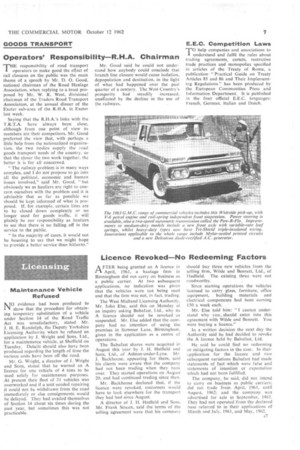Operators' Responsibility—R.H.A. Chairman
Page 9

If you've noticed an error in this article please click here to report it so we can fix it.
THE responsibility of road transport operators to make good the effect of rail closures on the public was the main theme of a speech by Mr. D. 0. Good, national chairman of the Road Haulage Association, when replying to a toast proposed by Mr. W. R. West, divisional chairman of the Traders Road Transport Association, at the annual dinner of the Exeter sub-area of the R.H.A. in Exeter last week.
Saying that the R.H.A.'s links with the T.R.T.A. have always been close, although from one point of view its members are their competitors, Mr. Good preferred the view that, with perhaps a little help from the nationalized organization, the two bodies supply the road goods transport needs of the country, so that the closer the two work together, the better it is for all concerned.
"The railway problem is in many ways complex, and I do not propose to go into all the political, economic and human issues involved," said Mr. Good, "hut obviously we as hauliers are right to concern ourselves with the problem and it is advisable that as far as possible we should be kept informed of what is proposed. If, for example, certain lines are to be closed down completely or no longer used for goods traffic, it will plainly be our responsibility as hauliers to see that there is no falling off in the service to the public.
" In the majority of cases, it would not be boasting to say that we might hope to provide a better service than hitherto." Mr. Good said he could not understand how anybody could conclude that branch line closure would cause isolation, depopulation and destitution. in the light of what had happened over the past quarter of a century. The West Country's prosperity had steadily increased. unaffected by the decline in the use of the railways.




















































































































